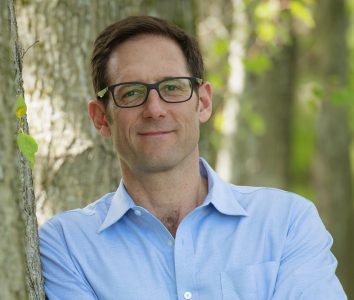Researcher Profile: CSFS Associate Sean Smukler
UBC Associate Professor of Applied Biology in the Faculty of Land and Food Systems and Soil Science Junior Chair in the department of Agriculture and the Environment.

What is your current research project and what is it all about?
My lab, the Sustainable Agriculture Lab, works on helping farmers in two specific ways: we help farmers reduce their environmental impact and we help farmers adapt to climate change.
What’s next for this project?
One of the projects we are now just launching is a five-year project to mitigate greenhouse gases; working with forage, potatoes and blueberries. We’re monitoring and quantifying greenhouse gases from those systems and evaluating how much carbon could be stored in farmers’ soils. Our goal is to provide some management recommendations to those farmers. We’re also working on an assessment of how soil carbon is changing in the Fraser Valley depending on various land uses and soil management practices. Another project that we’re just launching is looking at how to better manage nutrients in organic farming systems. This means specifically identifying the challenges of meeting nutrient demands for organic vegetable production.
Why does this work matter to you?
I think understanding the intersection of the environment and agriculture is something that we really need to get a handle on. Considering the dual challenge of global food security and global environmental sustainability, agriculture is right in the nexus of that. Yet we, as a society, have not employed very effective strategies for incentivizing farmers to adopt practices that will improve their farms’ sustainability or reduce their environmental impact.
What surprises you about this work?
I’ve been a little surprised about how little support agriculture has from government in terms of research and development. For a sector of its importance, it is not getting as much support as it should. I don’t think that people have an awareness of the need for food production because it is so plentiful at the moment from places such as California, but give it ten years and BC’s agricultural landscape will look very different.
How important is the Centre for Sustainable Food Systems at the UBC Farm to your work?
It’s pretty essential, in terms of having a research facility. The Faculty of Land and Food Systems has two agricultural research facilities: the Dairy Research facility in Agassiz and the Centre for Sustainable Food Systems at the UBC Farm. It is really important to have a controlled experimental setting to study some of the things that we’re interested in. We do a lot of on-farm work, and that is equally valuable, but without the controlled setting, it’s really hard to come up to the conclusions that can be applied in the field.
How valuable is it to engage your students with the UBC Farm?
I think it’s really critical for students to have hands on experience and to get exposure to a wide range of scientific fields. The UBC Farm offers an opportunity for me and my class to expose students to a bunch of methodologies for different fields. Agroecology really does encompass a wide variety of fields and gives students a sense if it is something that they’re interested in doing. Without getting your hands dirty, it’s really difficult to know that.
What should people know about the UBC Farm that they probably don’t know?
They should definitely know that whether it looks like it or not, it’s a really state of the art facility to do some important agricultural research. I think we’re pushing the boundaries in specific scientific ventures. It may not look like a typical classroom, but it definitely is one.
What’s your favourite thing to do at the UBC Farm?
I really like showing students examples of what I’ve been talking about in class. There’s nothing like talking about intercropping and then going out to the Farm and seeing clover or kale under sown. Under sowing involves sowing a crop after a main crop has been harvested to cover the soil and provide benefits such as nutrient retention and mitigates the harmful impacts of soil erosion. I enjoy explaining why the Farm is doing that, or why the Farm would like more information on that particular practice. It definitely feels good when the real world and the lecture intersects out there.
If you weren’t researching agriculture, what would you be doing?
I think I’d be a farmer. Or the other thing I’ve thought about doing is policy.
Anything else you would like to add?
The UBC Farm has the potential to connect researchers on campus, especially those who are interested in food systems, food production and the environment. It seems like it has the potential to be a real important hub of change. This project that we’re doing to improve nutrients on organic farms looks promising. We’re going to be trialing on 20 farms in the region. At some point, we’re going to get all the people together and develop some strategies. It’s really an opportunity to get a bunch of farmers and scientists together at the UBC Farm and start building connections.
Comments are closed, but trackbacks and pingbacks are open.